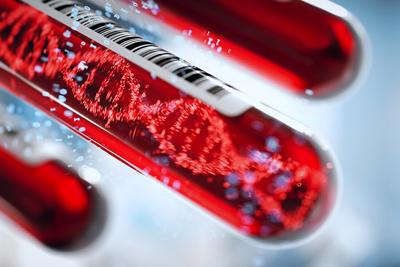Genetic testing examines a person’s DNA, the chemical database that carries instructions for how an individual’s body functions. This testing can reveal changes or mutations in the genes that may cause illness or disease.
That’s a basic definition by the Mayo Clinic. But it gets more complicated.
There are many types of genetic tests that are done for distinct reasons.
As examples, diagnostic testing may be warranted if a person is having symptoms of a disease that may be caused by genetic changes.
Pre-symptomatic and predictive testing may be suggested if a person has a family history of a genetic condition to show if there’s a potential risk of developing that condition. (See sidebar “What are some types of genetic tests?”)
Further, one genetic test cannot detect all genetic conditions.
Of note, genes are only one of many factors that contribute to disease. Other considerations that come into play include lifestyle, environment, diet, and physical activity.
Common diseases – such as diabetes, and certain types of cancer or heart conditions — do have genetic linkages, but environmental factors can also influence the conditions.
While genetic testing can provide valuable information for diagnosing, treating and preventing illness, there are limitations, clarifies the Mayo website.
As an example for a healthy person, a positive result from a genetic test doesn't always mean that they will develop a disease. On the other hand, a negative result doesn't guarantee that they won’t have a certain disorder.
Having a family member with a disease may suggest that a person has a higher chance of developing that disease than someone without a similar family history. But it does not mean that person will definitely develop the disease, says the Cleveland Clinic.
Discovering the potential for inherited genetic risk may lead an individual to question whether or not to share the information with other biological family members.
Health insurance usually covers genetic counseling. Insurance companies have different policies, and may cover some tests, but not others. (See sidebar “FAQs about genetic counseling”)
The above scenarios are just skimming the surface of aspects of genetic testing to consider when making decisions about personal health.
Providing counsel during a genetic testing journey
“The big point from my perspective is that you can’t just do a genetic test and think that is the answer. There’s a lot more complexity, interpretation, and human emotion,” said Maggie Miller, MS, CGC, a genetic counselor at Providence Hospital in Anchorage. “There’s a lot to think about.”
Miller emphasized that, while genetics are a powerful tool, patients “deserve to have a voice and be educated as a part of the process.”
Genetic counselors are part of a healthcare team, but they are not doctors. Typically, they have advanced training in genetics and counseling as related to medical care.
“We’re trained in multiple disciplines,” said Miller. A counselor’s education spans related molecular, biological and genetic topics as well as communication skills.
The National Society of Genetic Counselors describes the counselor’s role as guiding and supporting patients who seek more information about how inherited diseases and conditions might affect them or their families. They also help to interpret genetic test results based on personal and family history. (See sidebar “FAQs about genetic counseling”)
A patient is typically referred to a genetic counselor by a physician, such as an obstetrician, oncologist or medical geneticist. A geneticist, whether medical or clinical, is a doctor who specializes in understanding the links between genes and health.
Miller has been practicing genetic counseling for 20 years. She became a Certified Genetic Counselor, or GNC, in 2007. Genetic counseling as a career choice came onto her radar when she was a 19-year-old college student focused on the medical field. Her 41-year-old sister received genetic counseling for a pregnancy.
By graduate school when studying for a master’s in science, Miller was concentrating on cancer genetics. She was motivated by the “opportunity to prevent disease.” “Cancer specifically gives people the tools to catch things earlier and be in control,” she added.
“No one gene causes cancer,” explained Miller. It’s usually caused by a collection or spectrum of genes.
In most cancer cases, many mutations must happen one after another in different genes in a specific group of cells over time to cause malignancy, says the American Cancer Society.
There are trends in genetic-related diseases in Alaska. As examples, patients with Alaska Native ancestry are two times more likely to develop colon cancer and are three times more likely to develop gastric cancer compared to Americans of European ancestry.
But Miller said that a genetic reason for that likelihood has not yet been found. She said that it’s more complicated with multiple factors at play.
Genetic risks have implications for health care. For instance, if a person knows that they may have a risk for colon cancer, they may start getting colon screening earlier than the cancer society recommends. The ACS currently advises that people with average risk of colorectal cancer should start regular screening at age 45.
It gets more complex
An individual can order direct-to-consumer genetic tests online or in a store. The DTC is in contrast to clinical genetic tests ordered only by a healthcare provider on behalf of the patient.
The typical reason for taking a DTC test is to learn more about a person’s ancestry with people who are biologically connected.
However, these tests may lead to unexpected discoveries of familial information that a person may or may not be prepared to learn. As examples, finding a cousin through a DTC may also indicate that a person has a breast or ovarian cancer risk. In some cases, the person may discover that their family may not be their biological family.
DTC test results can be used to make decisions about lifestyle choices or identify issues to discuss with a healthcare provider, says the Centers for Disease Control. But DTC tests cannot determine for certain whether or not you will get a disease.
The CDC advises that a DTC test should not be used in place of clinical genetic testing to make decisions about treatment or medical care.
Genomics includes the scientific study of complex diseases such as heart disease, asthma, diabetes, and cancer. These diseases are more commonly caused by a combination of genetic and environmental factors rather than by individual genes, according to the National Human Genome Research Institute.
Genomic testing looks at a large number of genes all at once to see if any abnormalities can be identified. Broadly speaking, the genome is the complete set of genetic material of any living thing, including humans. (See sidebar “A brief primer on genetics and genomics.”)
Genomic testing, however, may predict or detect susceptibility to diseases without the ability to prevent, treat, or cure them. While some tests focus on genetic variants that are highly predictable, others may offer information that is probable, sometimes indicating only low- to moderate-risk.
More recently embraced is the use of a technology called “next-generation sequencing.” NGS does a deep dive into hundreds to thousands of genes at one time in multiple samples.
NGS’ forte is speed and relative inexpensiveness in sequencing entire genome, according to a 2019 article “Privacy and ethical challenges in next-generation sequencing” published in the National Library of Science.
NGS technology is used in clinical and research settings primarily in the diagnosis of hereditary and immune disorders, as well as non-invasive prenatal diagnosis. It is also used in treatment decisions for somatic cancers — those mutations that can occur in any of the cells of the body but are not hereditary.
The article says that the use of NGS raises complicated challenges regarding privacy, informed consent and the return of results. The latter involves carefully conveying to the patient the large amount of data that accompanies NGS results.
Ethical challenges arise
Genetic testing has raised ethical concerns about privacy, consent, discrimination, as well as the potential impact on a person's life.
Genetic discrimination is one topic of discussion among providers. An individual may be leery that their genetic makeup may be used against them in a variety of circumstances, such as employment, health or disability, insurance status, education, or health care.
There are federal and state laws to protect individuals from genetic discrimination. The federal Genetic Information Nondiscrimination Act, or GINA, was signed into law in 2008.
The act is designed to protect individuals against discrimination based on their genetic information in insurance coverage and employment. GINA does not offer protection in all cases. State laws vary from state to state. (See sidebar “FAQs about genetic counseling”)
In July 2022, the American College of Physicians produced a position paper on “Ethical Considerations in Precision Medicine and Genetic Testing in Internal Medicine Practice.”
The authors aimed to inform doctors about ethical decision-making when integrating precision medicine and genetic testing into clinical care. Precision medicine entails individualized care based on knowledge of a person's genetics, lifestyle, and environment.
Foremost is that decisions to offer genetic testing and sequencing should be guided by the “best interests of the patient and the best evidence,” said the position paper.
The authors acknowledged the key role of genetic counselors and geneticists in patient care. But they concluded that clinical physicians need to improve their genetic literacy to engage patients in informed conversations about the appropriateness, risks, and benefits of precision medicine and genetic testing.
Guiding a personal health decision
Each individual may have a different response to the possible result of genetic testing.
“It is a very personalized decision-making process,” observed Miller. A patient may be influenced by their family tree, cultural experience, or their personal experience with a disease, such as cancer, whether for themselves, a family member or a friend.
“You may check all the same boxes as the person before, but your counseling session might look very different based on your personal and family history but also your experiences and culture,” said Miller.
She viewed individualization as a good thing. “Generally, we want medicine to move into a personalized focus,” she said.
A person may find themselves at a fork in the road when coming to a decision about having a genetic test or not. For example, Miller said that while some people feel that knowing about a genetic risk helps them to be in control, some feel that they have no power at all.
Miller never pushes someone into having a genetic test. But she strives to educate them on the value in having options, such as prevention or surveillance, by having a test.
“A genetic counselor helps people make decisions, and we schedule to allow for the time to make that decision,” reassured Miller.
A session is usually scheduled for an hour but may take less time. Depending on a person’s need for more time to consider a decision, there may be multiple sessions.
The conversations may be in person or through telehealth. “We don’t need to be face-to-face to provide care,” said Miller. The test is performed from a small sample of bodily fluid or tissue usually from the blood, but sometimes from saliva or skin cells.
Counselors guide beyond the screening decision through management and prevention phases.
“Genetic counselors provide education, assessment and guidance of the care of familial and genetic conditions,” said Miller.
“I am an interpreter,” she said. “Genetics is another language and I’m here to help you interpret and make decisions.”















